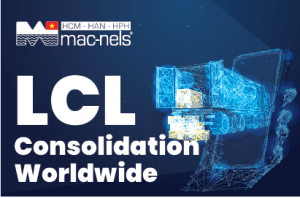Why is an FMC license necessary for shipping to the US?
06/05/2024An FMC (Federal Maritime Commission) license is necessary for shipping to the US because it ensures compliance with regulations governing ocean transportation intermediaries (OTIs). OTIs include both ocean freight forwarders and non-vessel operating common carriers (NVOCCs). These regulations are designed to protect consumers and ensure fair practices within the maritime shipping industry.

Here are a few reasons why an FMC license is necessary:
Legal Compliance and Regulation: The FMC, established in 1961, is an independent regulatory agency responsible for regulating international ocean transportation and ensuring a competitive and efficient ocean transportation system. It oversees ocean carriers, terminal operators, ocean freight forwarders, and NVOCCs.
- Ocean Freight Forwarders: These companies arrange the transportation of cargo from the point of origin to the destination, often handling logistics such as booking cargo space, preparing documentation, and arranging inland transportation.
- Non-Vessel Operating Common Carriers (NVOCCs): NVOCCs issue their own bills of lading and typically consolidate smaller shipments into full container loads for ocean transport. They operate similarly to ocean carriers but do not own or operate the vessels themselves.
Consumer Protection:
- Tariff Regulations: FMC regulations require licensed OTIs to publish tariffs detailing the rates, charges, and terms of service for their shipping services. This transparency ensures that customers are informed about the costs and terms associated with the transportation of their goods.
- Dispute Resolution: The FMC provides mechanisms for resolving disputes between shippers, carriers, and OTIs. This includes procedures for filing complaints and seeking mediation or arbitration to resolve conflicts.
- Bonding Requirements: OTIs are required to maintain bonds or other forms of financial security to compensate customers in the event of financial loss due to the OTI’s failure to fulfill its obligations.
Market Entry Requirement:
- To operate legally as an ocean freight forwarder or NVOCC in the United States, companies must obtain an FMC license. This license demonstrates that the company has met certain requirements regarding financial responsibility, business integrity, and operational capability.
- The FMC evaluates license applications to ensure that applicants meet the criteria established by law and regulation. This includes conducting background checks on company principals, verifying financial stability, and confirming compliance with bonding requirements.
Accountability and Oversight:
- The FMC monitors licensed OTIs to ensure compliance with applicable laws and regulations. This oversight includes conducting audits, investigations, and enforcement actions when necessary to address violations of FMC regulations.
- By promoting transparency, accountability, and fair competition within the ocean transportation industry, the FMC helps to maintain the integrity and efficiency of the global supply chain.
In summary, an FMC license is necessary for shipping to the US because it ensures legal compliance, protects consumers, establishes market entry requirements, and provides accountability and oversight within the ocean transportation industry.
To register for an FMC license, companies must adhere to certain terms and conditions set forth by the Federal Maritime Commission (FMC). These conditions typically include:
Financial Responsibility: Applicants must demonstrate financial responsibility and stability. This may involve providing financial statements, bank references, and proof of bonding or insurance coverage as required by FMC regulations.
Business Integrity: The FMC evaluates the business integrity of license applicants and their principals. This includes conducting background checks to ensure that individuals associated with the company have not been involved in criminal activities or other misconduct that would raise concerns about their suitability to operate as an ocean transportation intermediary.
Operational Capability: Companies seeking an FMC license must demonstrate operational capability to perform the functions of an ocean transportation intermediary. This includes having the necessary infrastructure, personnel, and systems in place to handle the booking, documentation, and transportation of cargo in accordance with FMC regulations.
Tariff Publication: FMC regulations require licensed ocean transportation intermediaries to publish tariffs detailing the rates, charges, and terms of service for their shipping services. License applicants must comply with these tariff publication requirements and provide evidence of their intent to publish tariffs in accordance with FMC regulations.
Bonding Requirements: OTIs are typically required to maintain bonds or other forms of financial security to compensate customers in the event of financial loss due to the OTI’s failure to fulfill its obligations. License applicants must provide evidence of compliance with bonding requirements as specified by the FMC.
Compliance with Regulations: Applicants must agree to comply with all applicable laws and regulations governing ocean transportation intermediaries, including FMC regulations, the Shipping Act of 1984, and other relevant statutes.
Recordkeeping and Reporting: License holders are required to maintain accurate records and provide reports to the FMC as requested. This may include records of transactions, financial statements, and other documentation related to the company’s operations as an ocean transportation intermediary.
Renewal and Compliance Monitoring: FMC licenses are typically issued for a specific term, after which they must be renewed. License holders are subject to ongoing compliance monitoring by the FMC, including audits, investigations, and enforcement actions as necessary to ensure compliance with FMC regulations.
By adhering to these terms and conditions, companies can apply for and maintain an FMC license to operate legally as an ocean transportation intermediary in the United States.
Mac-Nels Vietnam is not only offering LCL direct services for export/import, but we are also using Singapore as main hub to transit from/to all origins & destinations in the world.
With many global offices in Asia, Indian sub-continent, Middle East and reliable agent network in 125 countries. Leverage FCL and consolidation/LCL ocean services from our in-house non-vessel operating common carrier (NVOCC) with comprehensive service options you can expect:
- Bill of lading with maritime insurance
- Licenced non-US based NVOCCs issued by Federal Maritime Commission, our FMC N.o: 029378
- Reliable network around the world
- Service contract with carriers
If you have any shipments from/to US, please feel free contact with us:


